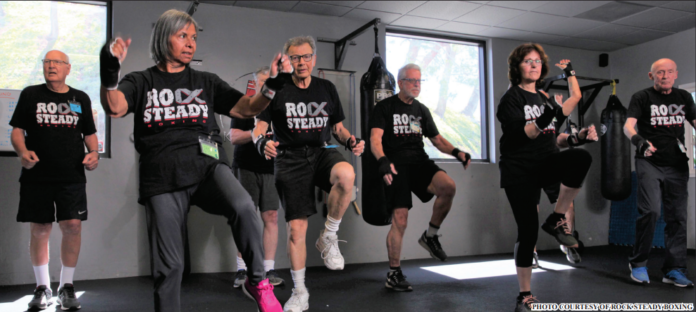Bringing life to bodies and brains: “If they don’t know what it’s about, they’re going to think, ‘Parkinson’s and boxing? What? I can’t do that,’” co-owner Lisa Oliver told the Guardian. “It doesn’t matter how old you are. It doesn’t matter [if] you think you’re too far gone for help. We will absolutely help you at any age, any stage — even if you’ve never exercised a day in your life.”
Every Monday through Friday, a joyful community of citizens attends class with Rock Steady Boxing VC/LA and boxes to delay and reverse their symptoms of Parkinson’s disease through scientifically proven boxing methods. Participants practice jabs, uppercuts and hooks in an energetic environment while teachers encourage them to conquer their disease.
“With Parkinson’s, there is no such thing as having to take a break from exercise,” Lisa Oliver, co-owner of Rock Steady Boxing VC/LA, says. “The more you do — the more you participate in our classes — the more you are able to decrease current symptoms and reverse some symptoms and delay progression of the disease. … We’re giving [participants] control over their lives so that they can remain independent so they can have a sense of purpose and hope.”
The Rock Steady Boxing VC/LA counts roughly 25 to 30 members for each Zoom class. Classes are open to those with Parkinson’s disease and their family or caregivers. Workouts focus on strengthening a boxer’s balance, stability, mobility, hand-eye coordination, mental focus, flexibility, agility, voice control and voice projection. Coaches urge boxers to work harder and longer than they think they can, helping them gain visible results through a little bit of tough love and an encouraging community.
“It’s called ‘passed their perceived limitations with forced intent exercise,’” Oliver told the Guardian. “What that means is that everything in their brain is saying ‘No’ and we are changing the message to ‘Yes.’ We are putting the synapses back together. We’re repairing broken synapses in their brains by pushing the movement when they don’t think they can. … We know that when they are pushed, they will see the benefits, that they will be able to control their movement and therefore control their lives and control their future.”
Co-owners Lisa Oliver and Yvette Israel also inspire the boxers throughout the workout, shouting phrases such as, “You are punching out Parkinson’s!”
“Remember, we are going to fight against the pull of Parkinson’s,” Oliver told students in her Monday morning class.
Rock Steady Boxing VC/LA trainers received training at the RSB headquarters in Indiana. Since the VC/LA branch’s inception in 2014, the group has helped hundreds of people diagnosed with Parkinson’s disease. The Newbury Park location, representing Ventura County and LA, often receives boxers who were referred by neurologists, physical therapists and other medical professionals.
“Many of my patients depend on this program and would have likely declined without it,” Dr. Adam Darby with UCLA Neurology says of the program. “I thank Lisa and Yvette for the prompt implementation of their program to the Zoom online platform to keep Parkinson’s patients moving, thriving, safe and in control of their lives.”
Israel guarantees participants who come to class and put in the effort will improve. The results speak for themselves.
“When I first came into the gym, I was on a walker, and I didn’t know another soul in the world dealing with Parkinson’s,” says Mike L., a Thousand Oaks resident. “I rarely use a walker anymore and have over thirty fellow boxers I’m proud to call friends. My coaches push me each class with love, always taking into account my limitations but helping me get stronger. Next to my incredible corner lady, my wife Paula, this is the best thing in my life.”
“Of all the medicine I’ve been prescribed, Rock Steady Boxing is the best,” Pete S., 74, says.
Boxers look forward to classes; some haven’t missed a session in five years, and the coaches say one man Zooms in from his vacation spot in Sweden. Oliver and Israel emphasize the built-in community of members dealing with the same issues and the hope it brings to participants.
“There’s a lot more that happens than just what takes place in the class as well because it gives people and their families a forum to share,” Oliver says. “If you could be surrounded by people who are striving toward the same thing, then you develop that camaraderie and friendship that motivates and inspires you to stick with it and continue. It gives the families resources that they’re not going to get at a doctor’s office where they can stick around after class, and they can talk to other spouses — other wives, other husbands — about what they’re doing at home that helps with mobility, that helps with sleep, things they’ve done in their house to make things easier, medications they’ve tried that have helped and things that haven’t helped. They can get referrals on doctors. It’s a place for everybody to get what they need that’s going to help the whole community.”
Oliver and Israel hope to spread the word that there’s hope for people with Parkinson’s and encourage them to try a free trial class, even if they don’t think they can box.
“If they don’t know what it’s about, they’re going to think, ‘Parkinson’s and boxing? What? I can’t do that,’” Oliver says. “It doesn’t matter how old you are. It doesn’t matter [if] you think you’re too far gone for help. We will absolutely help you at any age, any stage — even if you’ve never exercised a day in your life.”
“That’s the joy in all of this,” says Israel, “to see them not declining or slowing down with the progression of the disease — because there is no cure — and until then, we fill that gap.”

